THE ACCOUNTANT_AUTUMN_2018_VER-7-L
You also want an ePaper? Increase the reach of your titles
YUMPU automatically turns print PDFs into web optimized ePapers that Google loves.
FEATURE<br />
Is our workforce ready<br />
for an age of acceleration?<br />
LISA PULLICINO<br />
AN AUDITOR BY PROFESSION,<br />
LISA IS A PARTNER AT PWC<br />
MALTA WITH RESPONSIBILITY FOR<br />
HUMAN CAPITAL AND FOR PWC’s<br />
ACADEMY.<br />
I have a son aged fourteen. As he embarks on what is<br />
to be the start of a long student journey that should equip<br />
him with what is required to join the workforce, my biggest<br />
concern remains his future employability. My concern<br />
does not emanate from a common concern that robots<br />
might replace human activity but rather from a more basic<br />
concern: whether our current teaching methodologies<br />
are preparing him and our young generations adequately<br />
for the skillset which the workforce of the not-so-far<br />
future will need.<br />
The world in which we operate is going through rapid<br />
change - one where transformation is a reality - accelerated<br />
among other things by the onset of the new digital era. As<br />
a parent and as an employer, I often wonder whether, as a<br />
country, we are equipped enough for this transformation;<br />
and whether our education system is agile enough in the<br />
face of these accelerated changes. How prepared are this<br />
and future generations, how prepared is the country’s<br />
current and future workforce, how prepared are our<br />
current and future leaders for the agility and flexibility that<br />
will, without doubt, be required of them?<br />
Individuals’ preferences, behaviour and interactions<br />
are evolving, and the way in which organisations operate<br />
is also transforming. This shift poses important questions<br />
about the skills which will be required in future, our<br />
assumptions about careers and employment, and the<br />
extent to which Artificial Intelligence (AI), machine<br />
learning and robotic process automation will enhance,<br />
lessen or replace human activity. Now, more than ever,<br />
our educators, employers and business leaders need<br />
to collaborate, to anticipate, to plan and implement a<br />
fully-fledged strategy that will enable Malta to build the<br />
workforce of the future. And we must act fast, if we want<br />
to remain relevant and competitive.<br />
The change that we require needs to start at the very<br />
heart of our education system – it needs to focus on the<br />
country’s vision for education, the quality of teaching and<br />
the agility to transform and remain sustainable.<br />
The quality of teaching, a sustainable approach<br />
To achieve the success that other countries have<br />
achieved within education, we need to study and analyse<br />
their success factors in depth. Finland, for instance, is<br />
without doubt a pioneer and a world leader in this area.<br />
For starters, the teaching profession in Finland is highly<br />
valued, it follows a school system based on equality and<br />
trains teachers through science-based programmes.<br />
Teachers are free to choose their methodologies. Their<br />
aim is to equip students with a ‘can do’ attitude, a creative<br />
mindset, a problem-solving outlook and agility to adapt –<br />
all factors that are somewhat distinct from our country’s<br />
exam focused culture.<br />
The speed at which the world is changing and the<br />
digital era within which we are operating must be planned<br />
and catered for. Teaching methodologies cannot stagnate<br />
when everything else around us is changing. Not only must<br />
teaching content change but too must methodologies –<br />
moving away from an individualistic class-based approach<br />
into a team project-based approach, moving away from a<br />
one-man, one-solution mindset to solving complex issues<br />
together, moving away from a hand-holding culture to a<br />
research-based, collaborative culture.<br />
Learning skills rather than subjects<br />
While businesses today are in need of highlydeveloped<br />
talent in a wide array of specialized areas,<br />
employers and graduates often realize that there is a<br />
mismatch between what qualifications prepare our<br />
graduates for and the career-relevant skills that the<br />
modern workplace demands. The solution lies in the next<br />
level of innovation in learning to address this skills gap.<br />
Traditionally, teachers primarily teach and have<br />
taught school subjects. We now need to move away from<br />
teaching subjects and towards a future where teachers<br />
will increasingly teach comprehensive learning skills.<br />
We need to move away from learning mechanically and<br />
move into a space that our children, our young adults and<br />
our more mature audiences are active learners and fully<br />
engaged. This will make teaching and training problem<br />
and phenomenon based, developing learners’ analytical,<br />
problem-solving and thinking skills. It will lead to a much-<br />
14 Autumn <strong>2018</strong>
















